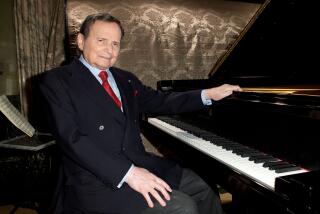THE RETURN OF LAZAR BERMAN--AND<i> GLASNOST</i>
- Share via
The Russian word glasnost, Lazar Berman noted, is not easily translated into English. As the Soviet pianist explained, “the term means something like ‘openness, the ability to say what you think.’ ”
Such a concept, of course, is familiar in this country.
And during these relatively sunny days of restored East-West cultural ties, glasnost seems to have gained renewed meaning in the Soviet Union as well, where Berman claimed that tensions within the artistic community have eased some.
“There have been more frank discussions between government officials and artists,” he said by telephone, speaking through an interpreter from his hotel room in Eugene, Ore. “At the last Congress of Soviet Composers, Rodion Shchedrin openly attacked the Ministry of Culture. A group of us recently complained formally to the ministry about pay, scheduling and such, and have received some concessions.”
For Berman, the crucial concession came in 1985, when Soviet leader Mikhail S. Gorbachev and President Reagan agreed to end the 6-year-old cultural exchange embargo between the two nations. With the lifting of that ban, Berman was permitted to return to America, where he had enjoyed some spectacular successes in the late ‘70s.
The 56-year-old pianist, who appears in recital at Ambassador Auditorium tonight, had not been pleased about his travel restrictions during the last seven years. Nor had he been silent.
“I felt sadness, not anger--there was no point in being angry,” he said. “And I stated my unhappiness repeatedly. I wrote letters to people in high places expressing my dissatisfaction. I believe that good cultural relations should have been reestablished before good political relations--not the other way around, as the authorities felt. I spoke out extensively on this.”
Such isolated protests have slowly, gradually, blossomed into organized protests, he explained. “You have to understand, the process of change is not a short or an easy one in the Soviet Union. The country is so vast, and there are many people in the middle ranks who are not used to thinking and reacting in new ways.
“In Old Russia, there was a saying: A horse is slow in rearing up, but fast in travel--meaning that we take a long time to get going.”
As eager as he had been to get going again, Berman’s reaction to getting the green light for his American tour was a mixture of emotions--not the least of which was curiosity. “I remember very well how much I was appreciated here on my previous visits. When I learned I would go back, I felt a most interesting sensation. How would I be received? Could my previous successes be repeated?”
Prior to his first tour, word-of-mouth in the West seemed to snowball to the point that he had almost become a legend before his time. And the response to his recital appearances had been euphoric--one critic lumped Berman together with fellow Soviet keyboard superstars Sviatoslav Richter and the late Emil Gilels.
On the basis of three recital appearances this month, Berman reported that “happily, so far, my questions have all had positive answers. The halls have been filled and the response seems even more enthusiastic. What I don’t know, of course, is whether people are noticing if I’m playing differently.”
Berman felt that he has grown musically since his last American tour. “I have accumulated a lot of experience,” he said. “I’ve been performing continually in Europe. Naturally, I remain the artist that I was, but I know better now what I want.”
In addition, he continued, he has expanded his repertorial horizons. Known as a Romantic virtuoso of staggering proportions--in the mid-’50s Gilels called him “the phenomenon of the music world”--Berman has now added some Bach and Mozart, as well as a number of works by contemporary Soviet composers. His Ambassador program, however, sticks mostly to familiar Romantic turf: plenty of Liszt, plus Mussorgsky’s “Pictures at an Exhibition.”
As for his future plans, Berman said he is scheduled to return to the United States in the fall with the Leningrad Symphony. No official word yet on a local engagement.
A bit farther down the road, there may be another Berman on the performing circuit: His son, Pavel, now 16, captured the Young Violinist’s phase of the Wieniawski Competition in Poland last year.
Though father and son have not yet solidified as a performing team, the pianist said, “We have recently come together as musicians.” But will the spirit of glasnost extend to rehearsal sessions in the Berman household?
More to Read
The biggest entertainment stories
Get our big stories about Hollywood, film, television, music, arts, culture and more right in your inbox as soon as they publish.
You may occasionally receive promotional content from the Los Angeles Times.










